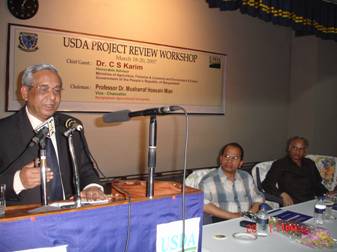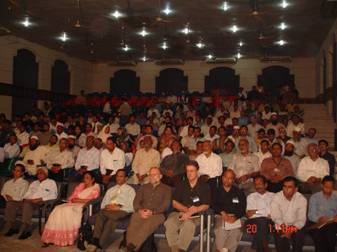|
||||||||||||||||||||
 |
||||||||||||||||||||
|
||||||||||||||||||||
NewsGLOBAL[Top]
FAO, USDA AGREED TO SUPPORT SUSTAINABLE GLOBAL AGRIC The United Nations Food and Agriculture (FAO) and the United States Department of Agriculture (USDA) recently signed an agreement that will strengthen cooperation between the two in their bid to support the development of a sustainable global agriculture system. Under the terms of the framework agreement, USDA funds and resources, including human resources, can be mobilized to support FAO projects promoting sustainable agricultural development and the attainment of the United Nations’ Millennium Development Goals in developing countries. The agreement was signed by FAO Director-General Dr Jacques Diouf and U.S. Secretary of Agriculture Mike Johanns. Read the news release at http://www.fao.org/newsroom/en/news/2007/1000509/index.html. [Top]
CORPORATE DECISIONS ABOUT LABELING GM FOODS There remain many challenges to encourage various food companies to label their products as “novel”, “engineered”, or “food that contains genetically modified ingredients”, says Canadian researchers Chris MacDonald and Melissa Whellams. Among the factors preventing a unilateral action include the absence of government intervention and of collective action on the part of the industry, and also lack of clear evidence that the foods pose risk to human health. MacDonald and Whellams state in their paper published by the Journal of Business Ethics that situations have not yet been encountered to make labeling ethically mandatory for agri-food companies. The researchers mention that companies should not feel obligated to label their products as long as long as they are marketing a legal product which they believe poses no threat to the public. The full paper can be accessed by subscribers at http://www.springerlink.com/content/q2h7872473t77452/. AFRICA[Top]
GM CROPS CONTRIBUTED TO POVERTY ALLEVIATION GM crops have contributed to the alleviation of poverty for many farmers, said Prof. Diran Makinde of the University of Venda in South Africa, in his presentation to Biovision. Makinde called for new approaches to ensure sustainable food production in developing countries, especially in Africa, including using biotechnology in crop production. Makinde referred to a study carried out in South Africa in 2002 in which Bt maize and Bt cotton were compared to non-Bt crop varieties and the Bt varieties, in both cases, were found to produce a higher yield and generate more profits to African farmers. Makinde questioned the European Union’s (EU) stance on genetically modified (GM) crops and its present policies on agricultural biotechnology which make it difficult especially to developing countries that engage in agricultural trade with the EU. European consumers generally perceive GM foods to be ‘contaminated’ and therefore developing countries that are dependent on the markets in Europe do not wish to grow them and are losing out on vast socio-economic benefits. Read the press release at http://www.europabio.org/GreenManifesto/PRESS_RELEASE-AFRICABIO_REPORT.doc AMERICAS[Top]
APHID-RESISTANT BARLEY NOW AVAILABLE
The United States Department of Agriculture Agricultural Research Service (USDA-ARS) and collaborators released two new varieties of barley that are resistant to all known types of Russian wheat aphid (RWA). The aphid has halted barley production in parts of eastern Colorado and Wyoming, and in parts of western Nebraska and Kansas. The new varieties, ‘Sidney’ and ‘Stoneham’, were developed by crossing an RWA-resistant barley material to a feed variety that was bred for drought-susceptible eastern Colorado but has been wiped out by the RWA. To read more: http://www.ars.usda.gov/is/pr/2007/070319.htm [Top]
CLIMATE CHANGE HOTTEST TOPIC IN CROP PRODUCTION A new study by scientists at the Lawrence Livermore National Laboratory (LLNL) and collaborators confirmed the detrimental effects of warming temperatures on global agriculture. Increasing temperatures since 1981 have caused annual losses of roughly $5 billion for the major cereal crops. This study is the first to estimate how much global food production already has been affected by climate change. Read the news release at http://www.llnl.gov/pao/news/news_releases/2007/NR-07-03-08.html. [Top]
COURT UPHOLDS DUPONT OWNERSHIP OF SOYBEAN MARKER TECHNOLOGY DuPont recently announced that its subsidiary Pioneer Hi-Bred International, Inc. has successfully concluded its patent infringement dispute with Genome and Agricultural Biotechnology (GAAB), LLC over in-plant protection against fiends of soybean in North America. The patents are for the process that uses molecular markers to select soybean varieties resistant to soybean cyst nematode (SCN). Pioneer has developed high-yielding SCN-resistant varieties in its product lineup through the use of molecular markers. Pioneer has held intellectual property rights for its soybean markers and for its marker-assisted selection process to select soybean varieties with brown stem rot resistance and other valuable traits. "We have invested a great deal in using molecular markers to increase the defensive package of soybeans," said Dennis Byron, Pioneer vice president, Crop Product Development. "We are pleased the court upheld our right to recoup that investment and fund future development." Access the press release at http://www.pioneer.com/web/site/portal/menuitem.3a0d043101b669b42f9d33f5d10093a0/. [Top]
BASF AND MONSANTO JOIN EFFORTS ON BIOTECH RESEARCH BASF and Monsanto Company have agreed to collaborate on research and development as well as commercialization activities in plant biotechnology. Focus of efforts will be on the development of higher yielding crops that are more tolerant to adverse environmental conditions such as drought. Both companies will contribute budgets that will total about US$1.5 billion. These funds will support research on yield and stress tolerance traits for corn, soybeans, cotton, and canola. The first products from the joint effort are projected to be commercialized in the first half of the next decade. The complete press release can be found at http://monsanto.mediaroom.com/index.php?s=43&item=470. [Top]
NDSU RELEASES HIGH YIELDING GM SOYBEAN The Agricultural Experiment Station of the North Dakota State University (NDSU), has developed a transgenic Roundup-resistant soybean variety named ‘RG7008RR’. Al Schneiter, chair of the University’s Department of Plant Sciences, announced that the new variety has a 1.8 bushel-per-acre yield advantage over the previous ‘RG6008RR’ variety. It will be marketed by the North Dakota State University Research Foundation through Roughrider Genetics. Read the press release at http://www.farmandranchguide.com/articles/2007/03/18/ag_news/production_news/prod24.txt. ASIA AND THE PACIFIC[Top]
ICAR RECONFIRMS HIGHER YIELD OF BT COTTON A Front Line Demonstrations (FLD) study on cotton for 2005-06 recently released by the Indian Council of Agricultural Research (ICAR) reconfirms a net 33.7% increase in seed yield of Bt cotton hybrids over non-Bt hybrids and 73.8% increase over open-pollinated cotton varieties (OPV). Data in the study came from 1,200 demonstration and farmers plots in 11 cotton growing states in India. In the demonstration plots, the Bt cotton hybrids proved to be highly productive with an average yield of 2,329 kg/ha of seed cotton compared to the non-Bt cotton hybrids (1,742 kg/ha) and varieties (1,340 kg/ha). Similarly, the average yield of Bt cotton hybrids was higher in farmers’ plots at 1,783 kg/ha compared to non-Bt cotton hybrids (1,362 kg/ha) and OPV in farmers' field (1,072kg/ha). Performance of Hybrids (Bt and non-Bt) and Varieties
The FLD study of cotton was conducted by the Division of Agricultural Extension of the ICAR, in collaboration with various stakeholders under the Mini Mission-II of the Technology Mission on Cotton (TMC). [Top]
DUPONT OPENS PLANT BIOTECH CENTER IN INDIA The first DuPont plant biotechnology research center finds a home in Hyderabad, India. A number of DuPont crop genetics scientists already have begun working at temporarily-leased facilities near the site where the new DuPont Knowledge Center will be built. The DuPont Knowledge Center is expected to house research programs for several businesses, including subsidiary Pioneer Hi-Bred International; DuPont Crop Protection; and Chemical Solutions Enterprise. "The center will allow us to access tremendous scientific talent in this region in support of DuPont's efforts to create products that address the food, feed, fuel and materials challenges of the 21st Century," said Balvinder S. Kalsi, President and CEO, DuPont India. [Top]
SCIENTISTS FOCUS ON WHEAT ROOTS TO IMPROVE PRODUCTION Scientists at Australia’s CSIRO Plant Industry are focusing on the roots of wheat plants to determine potential breeding parents for future wheat varieties. Jairo Palta and colleagues measured how quickly roots grew and the way they developed in different wheat breeding lines. The roots of the commercial variety, ‘Janz’, were compared with two wheat breeding lines, ‘Vig 18’ and ‘B18’, selected by CSIRO researchers for their early vigor. “The early and more abundant root branching increased the root length density, the number of roots, and the capacity of wheat to capture nitrogen,” said Palta. Incorporating early vigor traits into wheat varieties could reduce input costs and improve yield for farmers. Read the press release at http://www.csiro.au/news/ps2w6.html. [Top]
BIOFUEL BILL FOR MALAYSIA [Top]
BANGLADESH AGRI MINISTER SAYS BIOTECH IS “TECH OF FUTURE” Dr. C. S. Karim, the Advisor (Minister) for Agriculture, Fisheries and Livestock and Environment and Forests in Bangladesh dubbed biotechnology as the “technology of the future” in a keynote speech during the US Department of Agriculture Project Review Workshop 2007 held at the Bangladesh Institute of Nuclear Agriculture. Noting that other countries have already adopted the technology, Dr. Karim said that biotechnology could help contribute to sustainable agricultural development in the country. The Minister stressed the need to build a knowledge base on research and development programs related to genetically modified organisms. For more information, contact Dr. K.M. Nasiruddin of the Bangladesh Biotechnology Information Center at nasirbiotech@yahoo.com.
EUROPE[Top]
EFSA TO EVALUATE CRIIGEN PUBLICATION ON GM MAIZE The Committee for Independent Research and Information on Genetic Engineering (CRIIGEN) recently published a report on genetically modified maize MON 863 containing a revised statistical analysis of the 90 day rat study considered in the risk assessment. The European Food Safety Authority (EFSA) said that it will carefully evaluate the CRIIGEN publication and its new statistical analysis including any possible significance this publication may have on the risk assessment of MON 863. MON 863 maize has been subject to a comprehensive risk assessment by EFSA and by other authorities which did not identify any adverse effects on human and animal health or the environment. Read the complete press release at http://www.efsa.europa.eu/en/press_room/press_statements/mon863.html [Top]
UK FOOD STANDARDS AGENCY NOT GUILTY IN GM RICE CASE The United Kingdom Food Standards Agency (FSA) was accused by the environmental organization Friends of the Earth (FoE) of having failed to fulfill its food inspection obligations as an aftermath of the GM rice LL601 incident. In a Judicial Review, a High Court judge found the food agency not to be guilty in legal terms, but said it made several mistakes in handling the emergency. The FSA stated that it will review internally its response to the contamination case, and to take into account the criticisms of the judge. To read the news article, visit http://www.coextra.eu/country_reports/news814.html. Research[Top]
BACTERIAL ROT LESS FREQUENT IN PHILIPPINE BT MAIZE The incidence of bacterial stalk and ear rot was observed to be significantly lower in Bt corn than its non-Bt counterparts in the Philippines. The study conducted by researchers in Pioneer Hi-Bred Philippines and Iowa State University showed that the use of biotech maize in areas where the bacterial rot disease is prevalent can be advantageous to farmers. The disease is caused by the bacterial pathogen Erwinia chrysanthemi pv. zeae. The researchers conducted their study in nine field sites in the Philippines. Three transgenic maize hybrids expressing Cry1Ab protein and their conventional counterparts were planted. Comparative assessment of the Bt and non-Bt maize showed that the biotech maize have significantly lower mortality due to the disease, are free of Asian corn borer infestation, and have higher yield compared with the conventional variety. The transgenic hybrids yield about 1.2 to 5.1 tons per hectare more than the conventional maize. For the abstract of the paper, please visit http://www.apsnet.org/pd/summaries/dap07sum.asp#Dalmacio. Subscribers to the Plant Disease journal can also view the full paper at http://www.apsnet.org/pd/SubscriberContent/2007/PDIS-91-4-0346.pdf. [Top]
PRODUCTION OF FEED ADDITIVE IN GM POTATO The production of the feed additive xylanase using potato was demonstrated possible by a group of researchers in the Chinese Academy of Agricultural Sciences. Xylanase is an important enzyme incorporated in animal feeds to help poultry and monogastric animals, such as pigs and horses, break down xylan - a protein that hampers the rate of digestion and the absorption of nutrients in those animals. Xylanase is currently commercially produced using microbial fermentation. However, the researchers led by Peilong Yang have proposed that producing the compound in potato can be an economical alternative. In addition, the biotech potato can be directly fed to poultry or other animals. To produce the transgenic potato, the gene xynB from a Streptomyces bacterium was incorporated to the potato cultivar ‘Desiree’. The researchers determined that xylanase was present at up to 5% of total soluble leaf protein in the potato cytoplasm. In addition, it was observed that the specific activity of the xylanase enzyme was sufficiently high in both leaf and tuber extracts from the transgenic potato making it suitable for industrial or commercial purposes. The research paper in the journal Biotechnology Letters can be accessed at http://www.springerlink.com/content/0u63112813r15285/. [Top]
DETECTION OF PLANT VIRUSES VIA ENHANCED ELECTROCHEMILUMINISCENCE -PCR Viruses can reduce crop productivity and affect the food supply and the environment. Many techniques have been developed for the detection of plant viruses. Examples include serological techniques and polymerase chain reaction (PCR) of viral genomes. However, these current detection methods, says a group of Chinese researchers, are usually tedious, multi-stage, have low-sensitivity and high cost. Ya-bing Tang and colleagues at the South China Normal University have reported a modified electrochemiluminiscence (ECL) technique to detect plant viruses. ECL refers to light that is emitted when a molecule is electrochemically stimulated. The group has improved the current ECL-PCR method by adding extra nucleotide sequences to the PCR primers. They tested the method by detecting papaya leaf curl virus in their plant samples. The researchers report that they were able to increase the sensitivity of virus detection to 50 femto-mol (fmol) of PCR products with the modification. Normally the limit for ECL-PCR is 100 fmol. The method has also been reported by the group as a way to detect transgenic organisms in a previous study. The abstract in Analytica Chimica Acta, with links to the full paper for subscribers, can be accessed at http://dx.doi.org/10.1016/j.aca.2006.09.021. [Top]
BIODIESEL FORUM 2007 The Biodiesel Forum 2007 is slated on 27-28 June 2007 in Jakarta, Indonesia. The two-day conference will include information from case studies, panel discussions and talks by industry experts and practitioners. After the conference, participants can also attend two additional workshops that will provide hands-on training in biodiesel project financing and gain information on how to set-up a biodiesel plant. SYMPOSIUM ON BARLEY IN THE SOUTHERN HEMISPHERE The 13th Australian Barley Technical Symposium will be held in Fremantle, Western Australia on 26-30 August 2007. The event aims to bring together all of the barley research, marketing and processing industries of the southern hemisphere. Barley researchers, members of the Australian barley industry, university students, grain marketers, and buyers of Southern Hemisphere barley are encouraged to attend. For more information, visit http://www.promaco.com.au/2007/abts/. CALL FOR NOMINATIONS FOR 2007 CRAWFORD FUND DEREK TRIBE AWARD The nomination is now open for the 2007 Crawford Fund Derek Tribe Award. The Award is made biennially to a citizen of a developing country in recognition of their distinguished contributions to the application of research in agriculture or natural resource management in a developing country or countries. In addition, the recipient will be invited for a two-week visit to agricultural centers in Australia with the intention of enhancing networking and linkages between the recipient's home institution and country with similar bodies and individuals in Australia. For more information, visit http://www.crawfordfund.org/events/pdfs/DTAward2007Final.pdf. ISTA GMO WORKSHOP The International Seed Testing Association (ISTA) and Ege University will hold a More on the event https://www.seedtest.org/en/workshopdetail---1--1113--210--36.html. GLOBAL SCIENTIFIC CHALLENGES: PERSPECTIVES FROM YOUNG SCIENTISTS The International Council for Science (ICSU) has organized a conference aiming to bring together young scientists from across the world, and from different disciplines, to discuss and debate some of the key challenges for science in the 21st century. The conference is to be held on 4-6 April 2007 in Lindau, Germany. The event is designed to attract and stimulate the interests of those who will play a leading role in international research over future decades. ICSU is a non-governmental organization representing a global membership that includes both national scientific bodies and international scientific unions. More on the event at http://www.icsu.org/10_icsu75/75ANNIV_Young.html
|
||||||||||||||||||||


